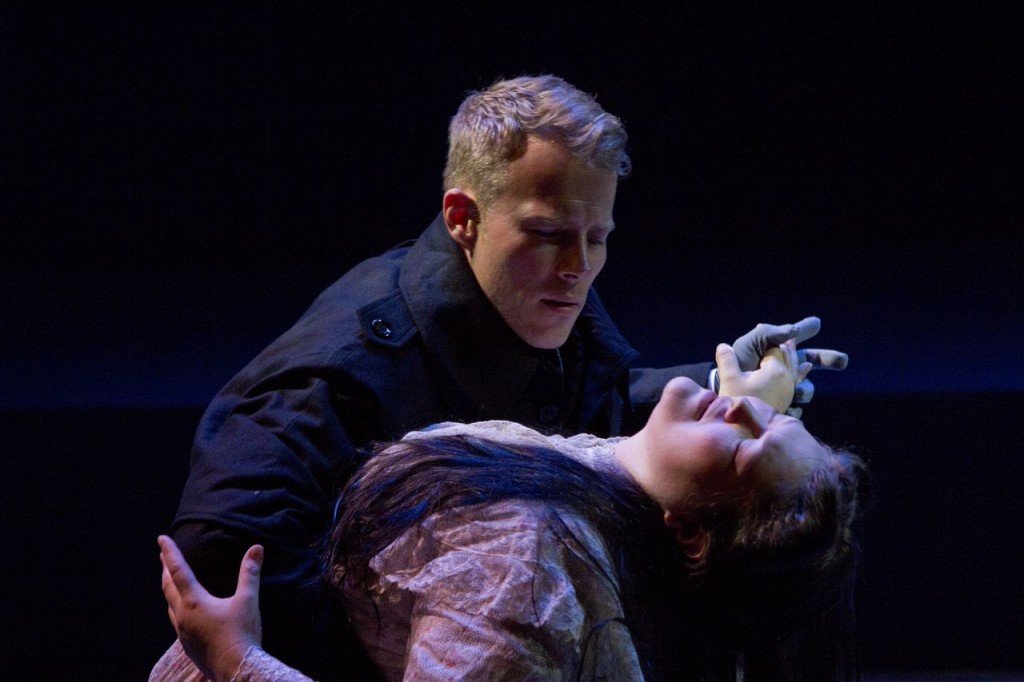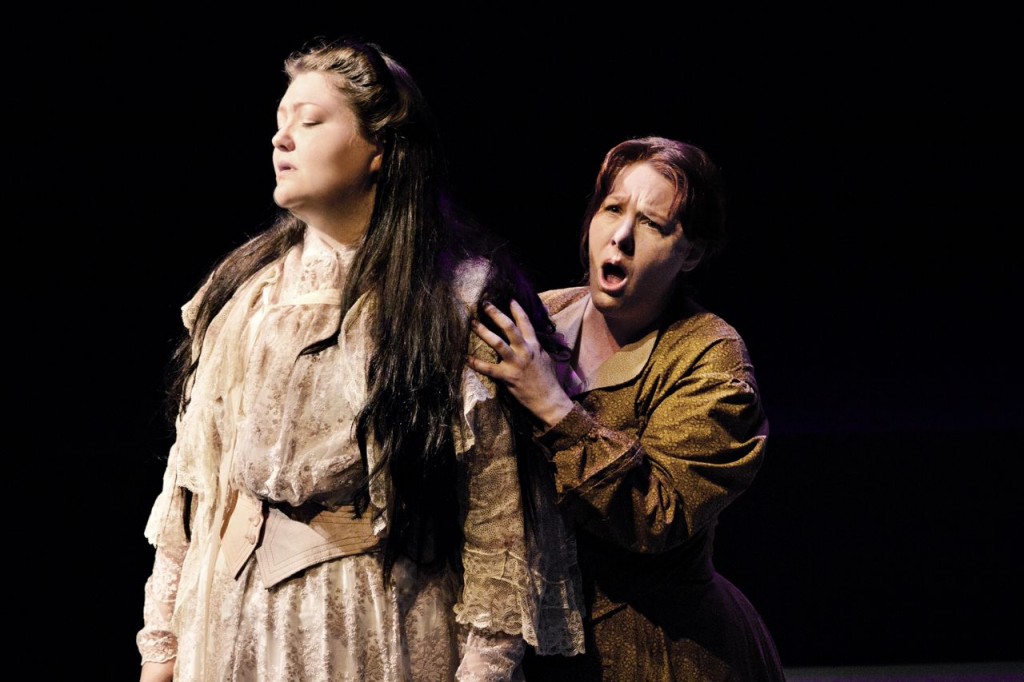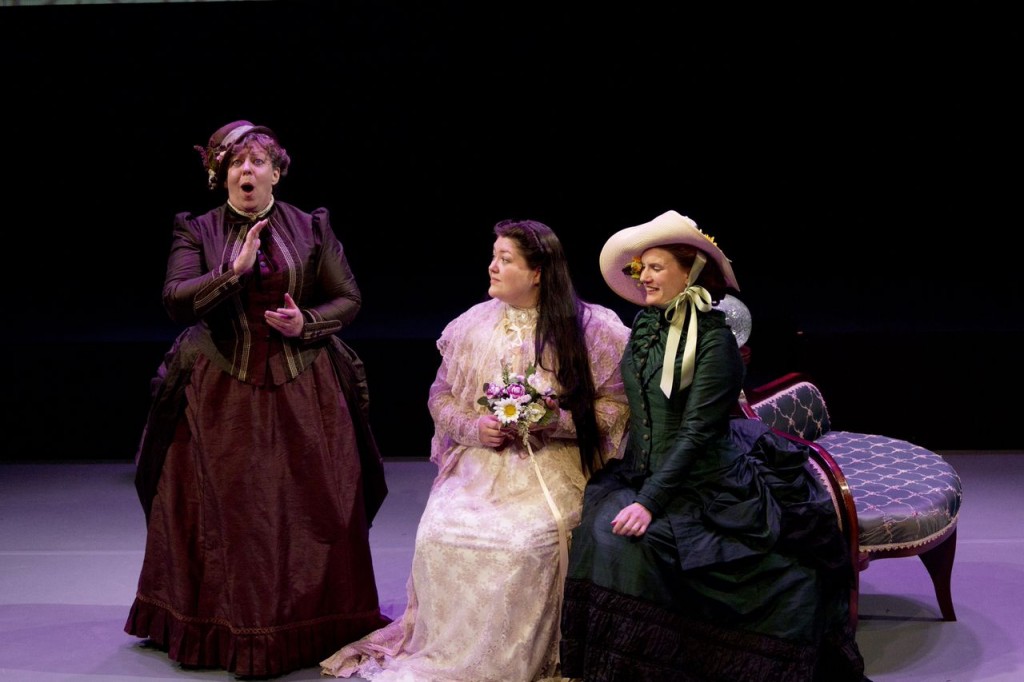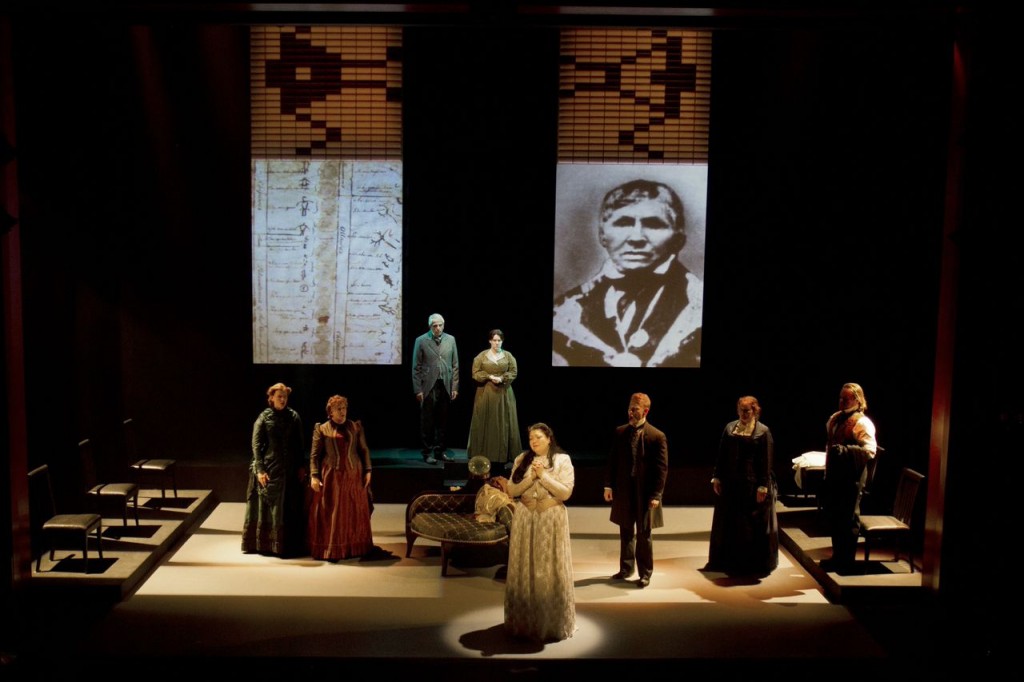
Credit: Michelle Doherty Photography
At York Theatre until May 31
604-251-1363/tickets.thecultch.com
Posted May 26, 2014
I don’t like opera: it’s a personal failing. And I have no credibility as an opera critic. So what was I doing at the world premiere of Pauline, presented by City Opera Vancouver?
Three good reasons: the libretto was written by Margaret Atwood; stage direction is by Norman Armour, artistic and executive director of the PuSh Festival; and the titular Pauline is Pauline Johnson (1861-1913), part Mohawk, part English and whose ashes are buried near Siwash Rock.
As a girl, I read Flint and Feather from cover to cover many times, always imagining war-painted braves, the thundering hooves of horses, and strong Indian women prepared to kill rather than be taken as slaves. I pulled it off my shelf and read it again before going to see Pauline: “By right, by birth, we Indians own these lands/Though starved, crushed, plundered, lies our nation low/Perhaps the white man’s God has willed it so.” Passionate, still relevant stuff.
If I were an opera buff, I’d probably see Pauline because the music was written by Tobin Stokes, former Composer in Residence for the Victoria Symphony and a much sought after composer on the international scene.
So how did I like it?
I loved it.

Credit: Michelle Doherty Photography
Even though Pauline is in English, the words are projected stage left and stage right. That’s a plus. Some of the libretto is straight-ahead Atwood and, therefore, sometimes very witty. When Pauline’s doctor asks her – in song, of course – “How are we today” you can hear Atwood’s sharp tongue through Pauline’s response: “One of us is fine”. The other ‘one’, of course, is Pauline who is dying of cancer. Also projected are parts of Johnson’s poems and some wonderfully lyrical passages by Atwood. The language – Atwood and Johnson’s – is glorious.
We know from the start that Pauline is dying. Rose-Ellen Nichols, proudly Coast Salish, sings the role of the poet and appears languishing in an elaborate white-on-white, lacy gown. Pauline is attended by her doctor (sung by Adam Fisher) whom she sometimes fantasizes as her former manager as well as imagining him as Drayton, a much younger man to whom she was once engaged. Through the morphine haze induced her doctor, Pauline sifts through letters, re-imagined performances and ‘sees’ her deceased Grandfather Smoke (John Minágro) who beckons her to join him in the land of the dead.
A chirpy trio of women (Cathleen Gingrich, Eleonora Higginson and Diane Speirs), beautifully costumed in taffeta gowns with bustles, long sleeves and high necklines created by Mara Gottler, visit Pauline (“We’ve come to cheer you up,” they warble) to gush over her poetry and commiserate over her failing health.

Credit: Michelle Doherty Photography
Pauline’s sister Eva (Sarah Vardy) arrives, convinced Pauline is just being dramatic and is not dying at all; she shoos the doctor and nurse away. It’s a thankless role and Vardy has us all intensely disliking Eva.
The music, for those of us whose ears are not attuned to contemporary opera, is difficult but the singing is grand. Nichols and Adam Fisher (as the phantom ex-fiancé) sing “Miss Johnson, I Have”; it’s a heartbreaker.
The set, co-designed by Marianne Nicolson and John Webber (who also designed the superb lighting) is elegant with two long panels stage left and right on which Tim Matheson projects images of Pauline Johnson as a child and as a performer; letters and various historical documents are also projected there.
Charles Barber is the music director and conductor of the seven-piece orchestra.
Pauline makes for a rich and wonderful evening at the theatre. A bonus, for me, was discovering, finally after all these years, that the name Johnson took for herself – Tekahionwake – is pronounced “dega-eeon-wageh”. It translates as “double-stranded” which, indeed, Pauline Johnson – in a buckskin vest worn over a Victorian gown – was.
Atwood adds librettist to her long and impressive list of accomplishments. Is there no end to what this Canadian icon can do?

Projections: Tim Matheson
Credit: Michelle Doherty Photography

